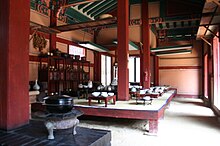Following the end of military rule in South Korea and the ensuing liberalization of the country's culture industry in the 1990s, an increasing number of Korean dramas began to be exported abroad. This marked the beginning of the Korean Wave, a broader cultural phenomenon encompassing the rise in global popularity of South Korean television, pop music, film, fashion, animation, literature, food, and cosmetics. During the 2000s, Jewel in the Palace and Winter Sonata achieved notable success within Asia, while in the following decades Squid Game achieved breakout success internationally.
1990s
1991
1992
1996
1997
1999
2000s
2000
2001
2002
2003

2004
2005
2006

2007
2008
2009
- Boys over Flowers
- Iris
- Ja Myung Go
- Loving You a Thousand Times
- Queen Seondeok
- Smile, You
- You're Beautiful
2010s
2010
- The Great Merchant
- Life Is Beautiful
- My Girlfriend Is a Gumiho
- Pasta
- Playful Kiss
- Secret Garden
- The Slave Hunters
- Sungkyunkwan Scandal
2011
2012
2013
2014
2015
2016
2017
• Guardian: The Lonely and Great God
2018
2019
2020s
2020
2021
2022
Citations
- Chua & Iwabuchi 2008, p. 24.
- Chua & Iwabuchi 2008, p. 59.
- ^ Chua & Iwabuchi 2008, p. 15.
- Korean Culture and Information Service 2011, p. 27.
- Chua & Iwabuchi 2008, p. 244.
- Chua & Iwabuchi 2008, p. 217.
- Huang 2011, p. 8.
- Korean Culture and Information Service 2011, p. 34.
- ^ Jin 2016, p. 55.
- Jin 2016, p. 2010.
- ^ Korean Culture and Information Service 2011, p. 32–33.
- Jin 2016, p. 47.
- Chua & Iwabuchi 2008, p. 220.
- Chua & Iwabuchi 2008, p. 30.
- ^ Ju 2018, p. 11.
- ^ Chua & Iwabuchi 2008, p. 29.
- ^ Chua & Iwabuchi 2008, p. 28.
- Chua & Iwabuchi 2008, p. 220–221, 239.
- ^ Jin 2016, p. 56.
- Korean Culture and Information Service 2011, p. 24.
- ^ Kuwahara 2014, p. 193.
- Jin 2016, p. 52.
- Korean Culture and Information Service 2011, p. 35.
- Korean Culture and Information Service 2011, p. 31.
- ^ Ju 2018, p. 7.
- ^ Jin 2016, p. 48.
- Kuwahara 2014, p. 22.
- "'Who Are You- School 2015' OSTs Has A Hot Popularity In Taiwan". Yahoo!. June 3, 2015. Archived from the original on June 2, 2021. Retrieved May 23, 2017.
- ^ Choe 2021.
- "'녹두전' 효과 톡톡…웨이브, 유료 가입자·트래픽 동반 상승". Viva100. October 2, 2019. Archived from the original on October 3, 2019. Retrieved October 3, 2019.
- Lee Kyung-tak (October 2, 2019). "웨이브 "오리지널콘텐츠' 효과로 유료가입자 순증 4.5배↑"". Chosun Biz. Archived from the original on October 3, 2019. Retrieved October 3, 2019.
- Kim 2022.
References
- Choe, Sang-Hun (2021-11-03). "From BTS to 'Squid Game': How South Korea Became a Cultural Juggernaut". The New York Times. ISSN 0362-4331. Retrieved 2023-03-23.
- Chua, Beng Huat; Iwabuchi, Kōichi, eds. (2008). East Asian Pop Culture: Analysing the Korean Wave. Hong Kong: Hong Kong University Press. ISBN 978-988-8052-22-6. JSTOR j.ctt1xwb6n. OCLC 650784863.
- Huang, Shuling (2011-01-27). "Nation-branding and transnational consumption: Japan-mania and the Korean wave in Taiwan". Media, Culture & Society. 33 (1): 3–18. doi:10.1177/0163443710379670. ISSN 0163-4437.
- Jin, Dal Yong (2016-03-01). New Korean Wave: Transnational Cultural Power in the Age of Social Media. University of Illinois Press. doi:10.5406/illinois/9780252039973.003. ISBN 978-0-252-03997-3. JSTOR 10.5406/j.ctt18j8wkv.
- Ju, Hyejung (2018-07-30). "The Korean Wave and Korean Dramas". Oxford Research Encyclopedia of Communication. doi:10.1093/acrefore/9780190228613.013.715. Retrieved 2023-03-23.
- Kim, Victoria (2022-02-10). "How South Korea's music, TV and films were primed for the viral moment". Los Angeles Times. Retrieved 2023-03-23.
- Korean Culture and Information Service (2011-12-01). K-Drama: A New TV Genre with Global Appeal. Korean Culture No. 3. Ministry of Culture, Sports and Tourism. ISBN 978-89-7375-167-9.
- Kuwahara, Yasue, ed. (2014-02-20). The Korean Wave: Korean Popular Culture in Global Context. Palgrave Macmillan New York. doi:10.1057/9781137350282. ISBN 978-1-137-35028-2.